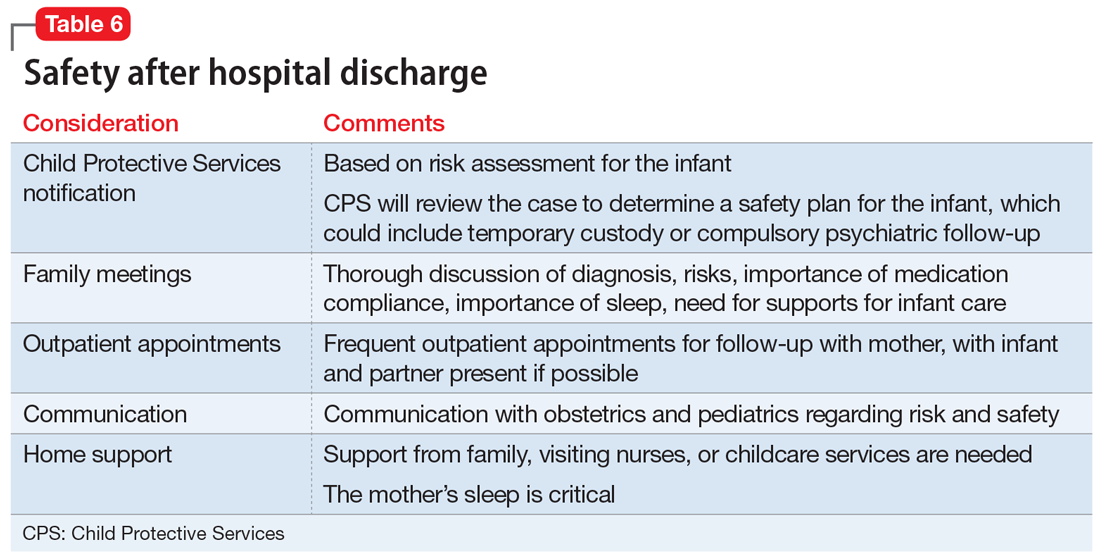Although this specialized treatment setting is unlikely to be available in most American cities, treatment should still consider the maternal role. When possible, the infant should stay with the father or family members during the mother’s hospitalization, and supervised visits should be arranged when appropriate. If the mother is breastfeeding, or plans to breastfeed after the hospitalization, the treatment team may consider providing supervised use of a breast pump and making arrangements for breast milk storage. During the mother’s hospitalization, staff should provide psychoeducation and convey hopefulness and support.
Medication management. Mood stabilizers and second-generation antipsychotics (SGAs) are often used for acute management of PPP. The choice of medication is determined by individual symptoms, severity of presentation, previous response to medication, and maternal adverse effects.30 In a naturalistic study of 64 women admitted for new-onset PPP, sequential administration of benzodiazepines, antipsychotics, and lithium was found to be effective in achieving remission for 99% of patients, with 80% sustaining remission at 9 months postpartum.6 Second-generation antipsychotics such as olanzapine and quetiapine are especially helpful because they can manage multiple symptoms, including insomnia, mood-related symptoms, and anxiety, although the risk of maternal weight gain and sedation (which could impair a mother’s ability to respond to her infant) should be discussed with the patient and needs to be monitored.33 Antidepressants should be avoided due to the risk of inducing rapid cycling or mixed mood states, although these medications may be considered for patients with PPD or postpartum OCD. Lactation inhibitors, such as bromocriptine and cabergoline, also should be avoided because they are dopamine agonists and can exacerbate psychosis. Electroconvulsive therapy is a safe and effective treatment for PPP and can be considered first-line treatment for high-risk patients when rapid improvement is needed.34 It has been proposed as a primary treatment for women with catatonia, agitation, compromised nutritional status due to refusal to eat or drink, high suicidality, or treatment resistance.30
Breastfeeding. It is important to discuss breastfeeding with the mother and her partner or family. The patient’s preference, the maternal and infant benefits of breastfeeding, the potential for sleep disruption, and the safety profile of needed medications should all be considered. Because sleep loss is a modifiable risk factor in PPP, the benefits of breastfeeding may be outweighed by the risks for some patients.9 For others, breastfeeding during the day and bottle-feeding at night may be preferred. Including the partner in this discussion and planning is important because they can play a crucial role in taking over some of the nightly feedings to facilitate maternal sleep. Give the family information about options for support in the home, such as doulas and baby nannies. The Related Resources lists a recent review of risks and benefits of mood stabilizers and antipsychotics during breastfeeding.
What to consider during discharge planning
Discharge arrangements require careful consideration (Table 6). Meet with the family prior to discharge to provide psychoeducation and to underscore the importance of family involvement with both mother and infant. It is important to ensure adequate support at home, including at night, since sleep is critical to improved stability. Encourage the patient and her family to monitor for early warning signs of relapse, which might include refractory insomnia, mood instability, poor judgment, or hypomanic symptoms.35 She should be followed closely as an outpatient. Having her partner (or another close family member) and infant present during appointments can help in obtaining collateral information and assessing mother-infant bonding. The clinician should also consider whether it is necessary to contact CPS. Many mothers with mental illness appropriately parent their child, but CPS should be alerted when there is a reasonable concern about safe parenting—abuse, neglect, or significant risk.36
Take steps for prevention
An important part of managing PPP is prevention. This involves providing preconception counseling to the woman and her partner.30 Preconception advice should be individualized and include discussion of:
- risks of relapse in pregnancy and the postpartum period
- optimal physical and mental health
- potential risks and benefits of medication options in pregnancy
- potential effects of untreated illness for the fetus, infant, and family
- a strategy outlining whether medication is continued in pregnancy or started in the postpartum period.
Continue to: For women at risk of PPP...


